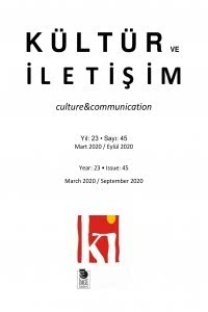Medya SorumluluŞu Düşüncesinin Yeniden şcadı: Yönetimsellik Ekseninde Bir Kavrayışa Doğru *
Medyanın etik sorumluluğu ve hesapverebilirliği son yıllarda medya düzenlemesini konu alan çalışmalarda oldukça kabul gördü. Ne var ki bu kavramların tarihselliklerine ve kuramsal temellerine pek de eğilinmediği, çoğu kez olumlamacı bir değerlendirmeye konu oldukları görülüyor. Bu yazının amacı, bu olumlamacı konumdan bir adım geriye çekilerek güncel medya etiği kavrayışının ideolojik analizi için eleştirel bir patika önermek. Bu patikanın temel taşlarını, Michel Foucaultnun liberal yönetme mantığının işleyişini açıklamak için önerdiği yönetimsellik kavramı ve bu kavramı neoliberal rasyonalite ve özdüzenleme pratikleri çerçevesinde yeniden düşünen literatür oluşturuyor. Yazıda temel olarak, hâkim sorumluluk retorişinin özgül bir iktisadi faydaya odaklı olduğu ve bu haliyle kamusal iletişimi yönetimsel aklın gereklerine tabi kıldığı savunuluyor.
The Reinvention of the Idea of Media Responsibility: Towards a Governmentality-Based Perspective
Ethical responsibility of the media and its accountability has been well acknowledged in the studies concerning media regulation. However, this recognition does not necessarily mean they are considered in a critical way in which their historical and theoretical aspects are fully examined. Rather, these concepts are understood from an affirmative standpoint which I deliberately avoid so as to offer an alterantive pathway for an analysis of the ideological implications of current trends in media ethics. For installing such a pathway, I appeal to the concept of governmentality, coined by Michel Foucault to define the liberal art of government and to the relevant literature which rethinks the governmentality associated with neoliberal rationality and self-regulatory practices. In the article, it was substantially argued that prevailing rhetoric of responsibility is anchored at a specific mode of economic benefit which eventually renders public communication subject to the requisites of governmental rationality.
___
- Badiou, Alain (2004). Etik: Kötülük Kavrayışı Üzerine Bir Deneme. Çev. Tuncay Birkan. İstanbul: Metis.
- Bardoel, Jo ve Leen, DHaenens (2004). Media Responsibility and Accountability: New Conceptualizations and Practices. Communications 29: 5-25.
- Barry, Andrew (2004). Ethical Capitalism. Global Governmentality: Governing International Spaces. Wendy Larner ve William Walter (der.) içinde. Londra: Routledge. 195-211.
- Bertrand, Claude-Jean (1990). Media Accountability: The Case for Press Councils. Intermedia 18(6): 1014.
- Butler, Judith (2005). Giving an Account of Oneself. New York: Fordham University Press.
- Cooper, Tom (1990). Comparative International Media Ethics. Journal of Mass Media Ethics 5(1): 3-14.
- Dean, Mitchell (2008). Governmentality: Power and Rule in Modern Society. Londra: Sage.
- Dimmick, John (1977). Canons and Codes as Occupational Ideologies. Journal of Communication 27(2): 181187.
- Ettema, James ve Theodore, Glasser (1987). Public Accountability or Public Relations? Newspaper Ombudsmen Define Their Role. Journalism Quarterly 64(1): 3-12.
- Foucault, Michel (2008). The Birth of Biopolitics: Lectures at the Collège de France 1978-1979. Franszc. Asl Çev. Graham Burchell. New York: Palgrave MacMillan.
- Foucault, Michel (der.) (2005). Yönetimsellik. Seçme Yazılar I: Entelektüelin Siyasi şşlevi (der.) içinde. Çev. Osman Akınhay ve Ferda Keskin. şstanbul: Ayrıntı. 264-287.
- Fraser, Nancy (2003). From Discipline to Flexibilization? Rereading Foucault in the Shadow of Globalization. Constellations 10(2): 160-171.
- Harvey, David (2007). A Brief History of Neoliberalism. Oxford: Oxford University Press.
- Hodges, Louis W. (1986). Defining Press Responsibility: A Functional Approach. Responsible Journalism. Deni Elliott (der.) içinde. California: Sage. 13-31.
- Larner, Wendy ve William Walters (2004). Introduction. Global Governmentality: Governing International Spaces. Wendy Larner ve William Walter (der.) içinde. Londra: Routledge. 1-20.
- Lemke, Thomas (2001). The Birth of Bio-Politics: Michels Foucaults Lecture at the Collège de France on Neo-Liberal Governmentality. Economy and Society 30(2): 190-207.
- Liederke, Luc van (2004). Media Ethics: From Corporate Governance to Governance, to Corporate Social Responsibility. Communications 29: 27-42.
- Messner, Martin (2007). Being Accountable and Being Responsible. Business Ethics as Practice: Representation, Reflexivity and Performance. Chris Carter (der.) içinde. Londra: Edward Elgar Publishing. 49-67.
- Nadesan, Majia Holmer (2008). Governmentality, Biopower, and Everyday Life. New York: Routledge.
- Nemeth, Neil (2003). News Ombudsmen in North America: Assessing an Experiment in Social Responsibility. Westport: Greenwood.
- Plaisance, Patrick Lee (2000). The Concept of Media Accountability Reconsidered. Journal of Mass Media Ethics 15(4): 257-268.
- Rose, Nikolas ve Peter Miller (1992). Political Power Beyond the State: Problematics of Government. British Journal of Sociology 43(2): 173-205.
- Schlesinger, Philip (1998). Freedom and Responsibility in Broadcasting: Inherent Tensions and Changing Contexts. Media, Culture&Society 20(2): 329-334.
- Taş, OŞuzhan (2012). Gazetecilik EtiŞinin Mesleki Sınırları: Profesyonellik, Piyasa ve Sorumluluk. İstanbul: İletişim.
- Thompson, John B. (2000). Political Scandal: Power and Visibility in the Media Age. Londra: Polity.
- ISSN: 1301-7241
- Yayın Aralığı: Yılda 2 Sayı
- Başlangıç: 1998
- Yayıncı: İmge Kitabevi Yayınları
Sayıdaki Diğer Makaleler
Hilelik: Nuri Bilge Ceylan'ın Üç Maymun Filminde Suç ve Suçun Yeniden Üretimi
İnan Özdemir TAŞTAN, Hatice KENEŞ ÇOBAN
Tek Parti Döneminde Politik Söz ya da RetoriŞin Yeri
Picnoleptic Horizons of the Knowledge Decade: Techno-Creative Communities in Turkey *
Medya Aktivizminin bir Biçimi Olarak Taktiksel Medya: icmihrak.blogspot.com Üzerine bir Analiz *
İşgal, Görkem, Tehlike: Kadifekale Gençlik Altkültürünün Deneyimlerinde Kentsel Dönüşüm Anlatıları *
Medya SorumluluŞu Düşüncesinin Yeniden şcadı: Yönetimsellik Ekseninde Bir Kavrayışa Doğru *
Erdem Koruyucuların Mücadele Alanı: Politik DoŞruculuk Üzerine Düşünceler*
Habeas Data Kavramı ve Kavramın Kişisel Verilerin Korunması Tartışmalarına Katkısı 1
